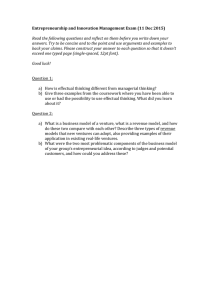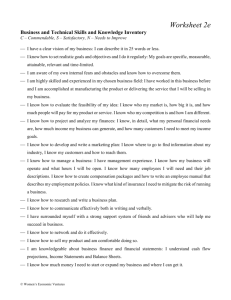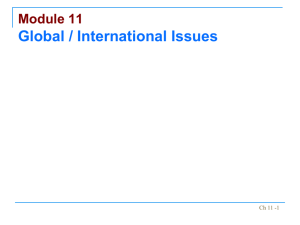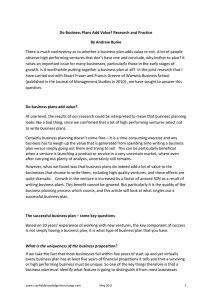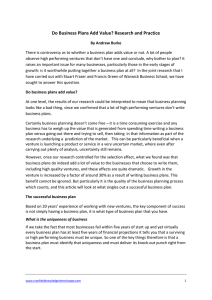Call for Papers for a Special Issue ORGANIZATIONAL DESIGN OF
advertisement
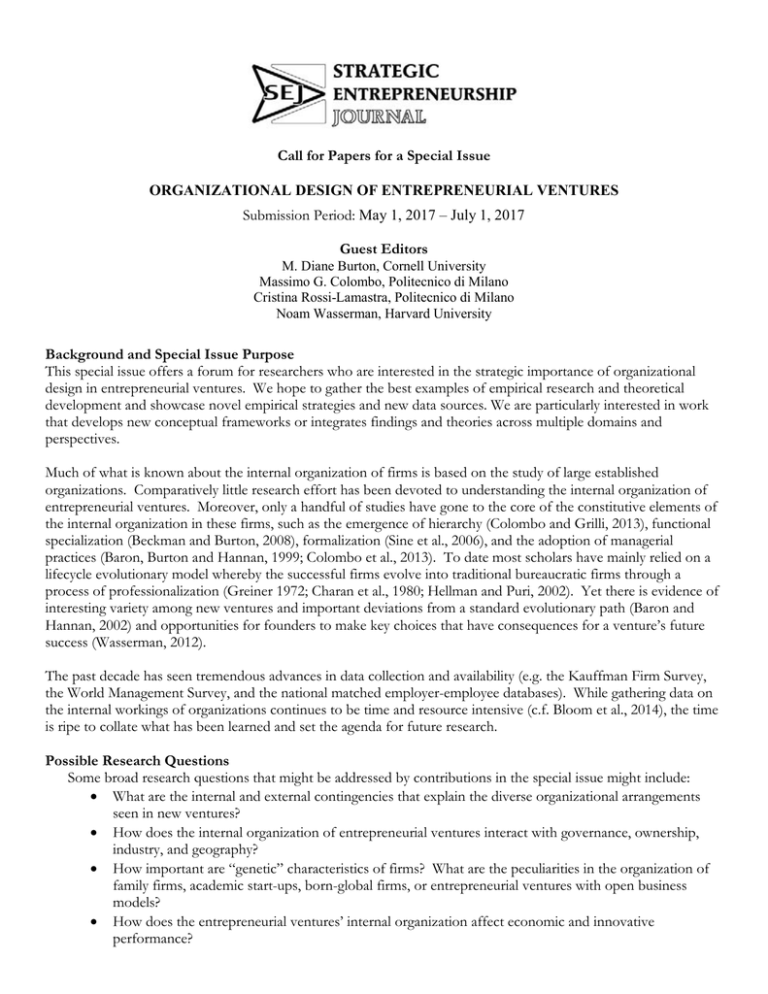
Call for Papers for a Special Issue ORGANIZATIONAL DESIGN OF ENTREPRENEURIAL VENTURES Submission Period: May 1, 2017 – July 1, 2017 Guest Editors M. Diane Burton, Cornell University Massimo G. Colombo, Politecnico di Milano Cristina Rossi-Lamastra, Politecnico di Milano Noam Wasserman, Harvard University Background and Special Issue Purpose This special issue offers a forum for researchers who are interested in the strategic importance of organizational design in entrepreneurial ventures. We hope to gather the best examples of empirical research and theoretical development and showcase novel empirical strategies and new data sources. We are particularly interested in work that develops new conceptual frameworks or integrates findings and theories across multiple domains and perspectives. Much of what is known about the internal organization of firms is based on the study of large established organizations. Comparatively little research effort has been devoted to understanding the internal organization of entrepreneurial ventures. Moreover, only a handful of studies have gone to the core of the constitutive elements of the internal organization in these firms, such as the emergence of hierarchy (Colombo and Grilli, 2013), functional specialization (Beckman and Burton, 2008), formalization (Sine et al., 2006), and the adoption of managerial practices (Baron, Burton and Hannan, 1999; Colombo et al., 2013). To date most scholars have mainly relied on a lifecycle evolutionary model whereby the successful firms evolve into traditional bureaucratic firms through a process of professionalization (Greiner 1972; Charan et al., 1980; Hellman and Puri, 2002). Yet there is evidence of interesting variety among new ventures and important deviations from a standard evolutionary path (Baron and Hannan, 2002) and opportunities for founders to make key choices that have consequences for a venture’s future success (Wasserman, 2012). The past decade has seen tremendous advances in data collection and availability (e.g. the Kauffman Firm Survey, the World Management Survey, and the national matched employer-employee databases). While gathering data on the internal workings of organizations continues to be time and resource intensive (c.f. Bloom et al., 2014), the time is ripe to collate what has been learned and set the agenda for future research. Possible Research Questions Some broad research questions that might be addressed by contributions in the special issue might include: • What are the internal and external contingencies that explain the diverse organizational arrangements seen in new ventures? • How does the internal organization of entrepreneurial ventures interact with governance, ownership, industry, and geography? • How important are “genetic” characteristics of firms? What are the peculiarities in the organization of family firms, academic start-ups, born-global firms, or entrepreneurial ventures with open business models? • How does the entrepreneurial ventures’ internal organization affect economic and innovative performance? Deadlines, Submission and Review Process Submissions to this special issue should be prepared in accordance with SEJ’s submission process described at http://sej.strategicmanagement.net. The submission window is from May 1, 2017 to July 1, 2017. Please make sure to indicate that your submission is for the special issue on Organizational Design of Entrepreneurial Ventures. Publication of this special issue is planned for late 2019 or early 2020. Further Information For questions regarding the content of this special issue, please contact the guest editors: M. Diane Burton, ILR School, Cornell University, burton@cornell.edu Massimo G. Colombo, Politecnico di Milano, massimo.colombo@polimi.it Cristina Rossi-Lamastra, Politecnico di Milano, cristina1.rossi@polimi.it Noam Wasserman, Harvard University, noam@hbs.edu For questions about submitting to the special issue, contact the SEJ managing editor: Sara DiBari, sejeditorial@wiley.com. References Aldrich, H. E., 1999. Organizations Evolving. Sage, Newbury Park, CA. Ambos, T.C. & Birkinshaw, J., 2010. How do new ventures evolve? An inductive study of archetype changes in science-based ventures. Organization Science, 21(6):1125-1140. Audia, P.G. & Rider., C.I., 2005. A garage and an idea: What more does an entrepreneur need? California Management Review, 48:6–28. Baron, J.N., Burton, M.D. & Hannan M.T. 1999. Engineering Bureaucracy: The genesis of formal policies, positions and structures in high-technology firms.” Journal of Law, Economics and Organization 15(1):141. Baron, J.N. & Hannan, M.T., 2002. Organizational blueprints for success in high-tech start-ups: California Management Review, 44(3):8-36. Beckman, C. M. & Burton, M. D., 2008. Founding the future: path dependence in the evolution of top management teams from founding to IPO. Organization Science, 19(1):3-24. Bloom, N., Sadun, R., Lemos, R., Scur, D. & Van Reenen, J. (2014) The new empirical economics of management. CEP Occasional Papers, CEPOP41. The London School of Economics and Political Science, Center of Economic Performance, London, UK. Boeker, W. & Karichalil., R., 2002. Entrepreneurial transitions: Factors influencing founder departure. Academy of Management Journal, 45:818–826 Carpenter, R.E., & B.C. Petersen, 2002. Is the growth of small firms constrained by internal finance? Review of Economics and Statistics 84:298–309. Charan, R., Hofer, C.W. & Mahon, J.F. (1980). From entrepreneurial to professional management; a set of guidelines. Journal of Small Business Management, 19:110-119. Colombo M.G., Piva E., Rossi-Lamastra C. 2013. Authorizing employees to collaborate with communities during working hours: When is it valuable for firms? Long Range Planning, 46(3):236-257. Colombo, M.G. & Grilli, L., 2005. Founders’ human capital and the growth of new technology-based firms: a competence-based view. Research Policy, 34(6):795-816. Colombo, M.G. & Grilli, L., 2013. The creation of a middle-management level by entrepreneurial ventures: Testing economic theories of organizational design. Journal of Economics & Management Strategy, 22(2):390-422 Daily, C.M. & Dalton, D.A.N.R., 1992. The relationship between governance structure and corporate performance in entrepreneurial firms. Journal of Business Venturing, 7(5):375-386. David, R & Han, S. 2003. A systematic assessment of the empirical support for transaction cost economics. Strategic Management Journal, 25:39–58. Delmar, F., Shane S. 2004. Legitimating first: organizing activities and the survival of new ventures. Journal of Business Venturing, 19(3), pp.385-410. Eisenhardt, K. M, 2010. Silicon Valley, theories of organization, and the Stanford legacy. Pp 191-205 (chapter 10) in Schoonhoven C.B, Dobbin F. (Eds.). Stanford's Organization Theory Renaissance, 1970–2000 Research in the Sociology of Organizations, Volume 28), Elsevier. Grandori, A, Gaillard Giordani, L., 2011. Organizing entrepreneurship. Abingdon, UK, and New York: Routledge. Pollock T.G., Fund B.R. & Baker T., 2009. Dance with the one that brought you? Venture capital firms and the retention of founder-CEOs. Strategic Entrepreneurship Journal, 3: 199–217. Simons, T. & Roberts, P.W., 2008. New organizational form penetration : the case of the Israeli wine industry. Administrative Science Quarterly, 53:235–265. Sine, W.D., Mitsuhashi, H., Kirsch, D.A., 2006. Revisiting Burns and Stalker : formal structure and new venture performance in emerging economic sectors. Academy of Management Journal, 49(1):121-132. Wasserman, N., 2006. Stewards, agents, and the founder discount: executive compensation in new ventures. Academy of Management Journal, 49(5):960–976. Wasserman, N., 2012. The Founder's Dilemmas: Anticipating and Avoiding the Pitfalls That Can Sink a Startup. Princeton, NJ. Princeton University Press. The SEJ is published by Wiley-Blackwell and is one of the many activities of the Strategic Management Society (SMS). The Society is unique in bringing together the worlds of reflective practice and thoughtful scholarship. The Society consists of over 3,000 members representing over 80 different countries. Membership, composed of academics, business practitioners, and consultants, focuses its attention on the development and dissemination of insights on the strategic management process, as well as fostering contacts and interchange around the world. SMS Executive Office Rice Building – Suite 215 815 W Van Buren Street Chicago, IL 60607 • USA +1 312-492-6224 sms@strategicmanagement.net
